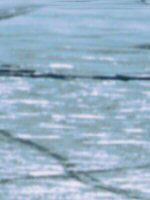|
The potential climate impacts of MOC change make it essential to identify changes that may be happening now. Recent observations suggest a freshening of North Atlantic water, a possible reduction in the formation of deep water in the Norwegian Sea, decreased northward flow of upper waters, and a slow-down of deep southward flow - indicative of a recent and sizeable slowdown in the Atlantic MOC. This contrasts with recent dramatic increases in North Atlantic sea surface temperatures, which in coupled climate models are correlated with a stronger MOC. This session seeks to explore the implications of recent observations, and to what extent observed changes may constitute an early warning of rapid climate change.
2. What does the past tell us about rapid climate change?
The palaeoclimate record contains numerous examples of climate changes that appear as rapid or abrupt changes between relatively stable states. In this session we will concentrate particularly on events for which it has been proposed that the cause may be changes in ocean circulation and heat transport: the Dansgaard-Oeschger events of the last glacial period, the Younger Dryas, and the event at 8.2 kyr in the Holocene. What really triggered these events, what were the climatic consequences of them, and to what extent do they serve as tests of the ability of models to simulate the climatic effects of changing thermohaline circulation? Contributions discussing the causes of fast changes in climate in the last two millennia will also be welcome.
3. THC, climate and weather in the 21st century
What are the likely changes in the THC in the 21st century,
given what we know of its past behaviour? If the THC changes,
what are the implications for the climate globally and more locally
on the weather patterns that affect the human population of the
planet? This session seeks to explore these questions by
examining how well models can explain recent observed changes
in the THC, climate and weather, and by looking at what they
predict could happen over the rest of the century. It will also explore
how we can best estimate and reduce uncertainties in the predictions and
test models using observations.
4. Outlook and Challenges
Climate change is inevitable, but while progress has been made in
understanding some of the process and mechanisms by which rapid climate
change may occur, many uncertainties remain. This session will seek to
explore what the key challenges are in understanding the role of the
ocean's thermohaline circulation in rapid climate change, and in quantifying
the probability of such change in the future.
|
|
Above: Heather Ackroyd working on 'Ice lens" during the Cape Farwell expedition to Svalbard in March 2005.
Art Exhibition
An art exhibition by artists taking part in the Cape Farewell Arctic expeditions will be held in the conference venue during the conference.
SOCIAL EVENTS
Tuesday:
Ice breaker reception at Holiday Inn, Birmingham
Wednesday:
Conference Dinner.
After Dinner Speaker: David Buckland, Cape Farewell: "The Art of Climate Change".
PANEL DISCUSSIONS
1. |
How have paleo studies helped us to improve models and predictions of rapid climate change?
|
2. |
What does society want to know about rapid climate change?
|
|





